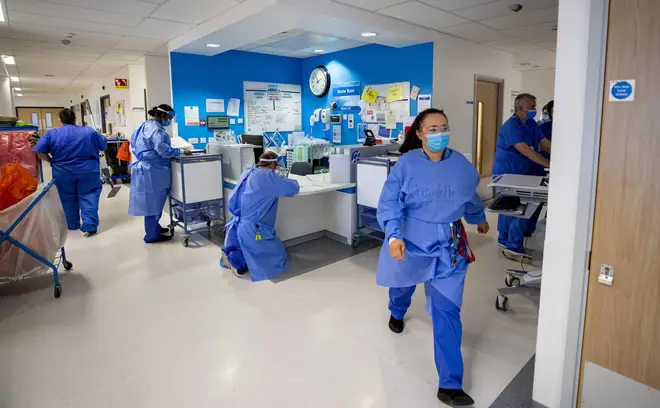
Richard Spurr 1am - 4am
8 August 2021, 09:48

The NHS waiting list in England could rise to 14 million by autumn next year and keep increasing following the challenges caused by the pandemic, a new report has warned.
The Institute for Fiscal Studies (IFS) has done modelling in an effort to show the potential scale of the waiting list challenge ahead.
It has warned that if millions of patients who did not receive care during the pandemic return to the health service for medical attention, then the number joining the waiting list could outstrip the number being treated.
A total of 5.3 million people were awaiting treatment at the end of May this year, marking the highest number since records began in August 2007 - despite hospitals admitting more patients.
The data from NHS England also showed that the number of people having had to wait over a year for treatment was 336,733 in May - almost 13 times the number it was a year earlier.
Read more: NHS waiting list hits record high despite hospital admission increase
Last month, Health Secretary Sajid Javid warned that NHS waiting lists in England could rocket to 13 million.
In an interview with the Sunday Telegraph a few weeks after being appointed to the role, Mr Javid said what had "shocked me the most" was "when I was told that the waiting list is going to get a lot worse before it gets better".
He said: "Hearing that figure of 13 million, it has absolutely focused my mind and it's going to be one of my top priorities to deal with because we can't have that."
Read more: NHS waiting list could rise to 13 million, Sajid Javid warns
Read more: Amanda Pritchard appointed as new Chief Executive of NHS England
NHS England's new chief executive, Amanda Pritchard, has acknowledged that among the pressures the NHS faces is "focusing on tackling the waiting times that have inevitably built up over the Covid pandemic".
Now the IFS has warned the number could top this figure if most of the approximately seven million so-called "missing" patients return to the health service for care over the next 12 months.
"In our first scenario, 80% of the approximately seven million 'missing' patients return over the next year, the NHS operates at 90% of its 2019 capacity this year and next, and then at 100% capacity from 2023 onwards," it explained.
Under this scenario, waiting lists would soar to 14 million by the autumn of 2022 and then continue to climb, as the number joining the waiting list exceeds the number being treated."

NHS Manager: 'This is how close to the edge the NHS is.'
The IFS said it is unlikely all patients will return as some will have died and others might have had private treatment r in some cases chosen to live with their health issues.
It said most, however, will probably require treatment at some point especially as virus cases decrease and "people are more willing to seek healthcare".
The extent to which these 'missing' patients come forward for care, and how quickly, therefore represents a hugely important 'known unknown' for the health service, it added.
Using different modelling on the number of patients likely to return for treatment and the capacity at which the health service operates, the IFS said that under even its most optimistic scenario the number of people waiting for treatment would rise to over nine million in 2022, and only return to pre-pandemic levels in 2025.
The organisation said this outcome would require the NHS to increase capacity by 5% this year and next, compared with 2019, and then by 10% in 2023 and beyond.
It said this would be the equivalent of treating about 1.6 million extra patients a year at a potential annual cost of at least £2 billion.

Questions asked over 3% NHS pay review
The Royal College of Nursing's England Director Patricia Marquis said the figures "confirm the immense task that lies ahead for health and care services in recovering from the pandemic".
"If the Health Secretary wants to address the looming waiting list crisis, he should start by investing in the workforce," she said.
"A significant pay rise will demonstrate value and help retain experienced nursing staff whom health services can't afford to lose with this challenge ahead."
Max Warner, a research economist at the IFS and an author of the analysis warned: "There is a real risk that if the NHS cannot find effective ways to boost its capacity - a challenge at the best of times, let alone after a major pandemic - then much longer waiting lists will be with us for years to come."
He said there were more than four million people on an NHS waiting list even before the pandemic.